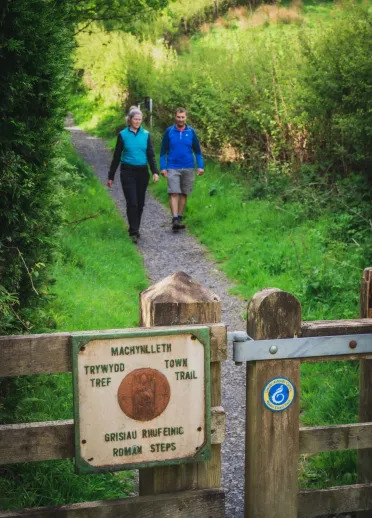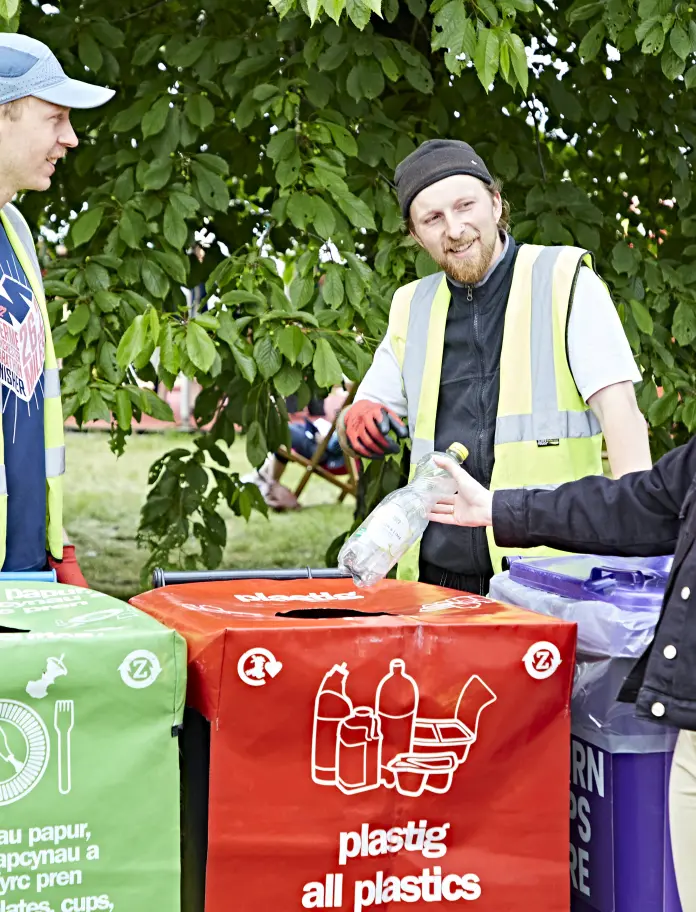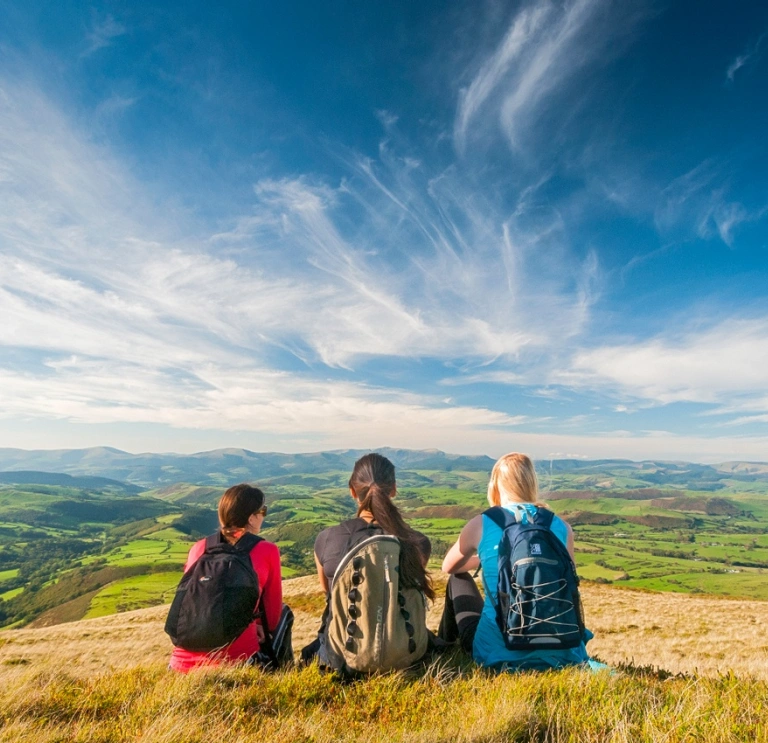Before you head out to explore Wales’ stunning coast and countryside, take a few minutes to get ready. A bit of planning goes a long way in making your adventure safe and unforgettable. Tick off these key safety checks, with advice from the RNLI and the Adventure Smart Wales campaign, before you go.
Your mountain checklist
Always check the weather
Check the weather forecast before you set off and remember to check conditions for different parts of your route. Prepare for the weather to change.
Carry a charged mobile phone
Remember to keep some charge on your phone in case you need to make an emergency call. Carry a charged power bank as a back up is a good idea. Note down emergency numbers separate to your phone in case you do run out of charge and need to use someone else's phone, or a payphone. It is also recommended to download maps so you can access them offline/without signal, as some areas might have limited mobile coverage.
Know where you are and where you’re going
If using an app on your phone to find your way, download your route before you set off and always carry a paper map with your route marked. Once you're sure of the path you need to follow, don’t leave it. If you’re lost, backtrack along the path to your last known point. It's also worth downloading Apps such as what3words or OS Locate for precise location sharing in emergencies.
Wear walking boots
Stay warm and dry, carry extra layers and waterproofs
Make sure they fit well and are comfortable. Choose these based on your style of walking and the terrain.

Start with a breathable base layer and an insulating mid layer. Waterproof over-trousers can be worn over breathable walking trousers. Don’t leave home without your waterproof jacket

Think about weather conditions and gear
Wear a wetsuit of appropriate thickness for the temperature and type of activity you’re doing. Wear a lifejacket or buoyancy aid (for kayaking, stand up paddleboarding, boating etc.) and don’t forget to carry the appropriate means of calling for help.
The Countryside Code
The Countryside Code is there to help everyone enjoy the outdoors safely, to show respect for each other, protect our environment, our wildlife and our beautiful landscape.
Wales is criss-crossed by a network of paths, tracks and unpaved roads. These trails will take you from your front door to the most remote parts of the countryside. Whether you’re travelling by wheel, heel or hoof, follow The Trail Users Code, know where you can go and share the space responsibly.
There are lots of things to do and places to stay on a dog-friendly holiday in Wales. If your dog is joining you on your day out, or your holiday, for safe and happy walks, and to avoid causing problems for others, follow The Dog Walking Code.
Other Codes for activities including watersports and angling can also be found on the Natural Resources Wales website.


Your coastal checklist
Choose a lifeguarded beach
RNLI lifeguards monitor the sea conditions, offer safety advice and keep an eye on activity. Find a list of all RNLI lifeguarded beaches on their website.


Check tide times before you set off
The tide can come in surprisingly quickly. Always check tide times before you set off, seek local information about where you’re heading, look out for safety signage and call 999 or 112 and ask for the Coastguard in an emergency.
Water safety
Many families love a day out on the beach – building sandcastles, paddling and exploring rock pools are all part of a proper seaside holiday. Remember, before you visit a beach, check out any potential dangers - such as rip currents and strong tides - that might be there. Use our coastal checklist and if possible, choose a lifeguarded beach. If you have a dog with you, be aware that some beaches have areas where dogs are restricted during the summer.
Entering the water quickly can result in cold water shock – remember to Float to Live if you get into difficulty: Relax, tilt your head back with your ears underwater, use your hands to help you float, and control your breathing.
If you find someone in trouble remember to ‘call, tell, throw’:
- Don’t put yourself at risk by entering the water, call 999 and ask for the Fire Service
- Tell them how to Float to Live
- Throw them something that floats
Take a look at the RNLI’s Beach Safety advice pages for tips to stay safe and have fun.
Open water swimming is becoming more popular due to the benefits to your health and wellbeing as well as being a fun activity. However, it's a lot different to swimming in a swimming pool. Expect the water temperatures to be a lot colder, there are risks of hidden dangers and for coastal areas you have the risk of rip currents and strong tides. We recommend you never swim alone, find one of the many local open water swimming groups we have in Wales and swim in one of Swim Wales’ SAFE Cymru accredited facilities. Further information on where to go swimming and how to be safe can be found on the Swim Wales website.
Recycle wherever you can
In Wales it’s law that everywhere has recycling bins so you can recycle your rubbish wherever you stay, and when you’re exploring.
We are proud to be the second-best recycling nation in the world.
Please help us keep Wales clean and free of litter by recycling.
You can find out more about recycling on the Wales Recycles website.

Be prepared
Keep your energy levels up by carrying a supply of food and drink. Pack the sun cream, sun hat and sunglasses. And please don’t forget to take away your litter.
When driving in rural Wales, be prepared for narrow country roads, single-track lanes, and unexpected livestock crossings - take it slow, stay alert, and use passing places considerately. If you're driving an electric vehicle in Wales, plan your route with charging stops in mind - while EV infrastructure is growing, rural areas may have fewer charging points.

Flooding
Natural Resources Wales has advice on how to prepare for flooding:
- Check the flood risk for the area where you are visiting or staying so you can see the potential risks of an area
- Check if the area is covered for free flood warnings or alerts for flooding from rivers or the sea. A flood alert would be issued if we expect flooding to a caravan or campsite. You can sign up, amend or cancel a flood warning account online.
- Check the forecast for the 5 day flood risk in the area
- Write down Floodline’s number 0345 988 1188 24-hour service in case you need live flooding information.
- Your accommodation or campsite may have developed a flood plan – ask before you arrive or on arrival, so you know if there are assembly points or flood warning information signs on site.
- Think about ‘what if’ scenarios of the site or surrounding roads flooding – what would you do and what would you need?
Further information and advice on extreme weather events including very hot, very cold and flooding is available from the Public Health Wales website.
Fire safety
Don’t light fires in open spaces or beaches and only have BBQs where signs say you can
Fires can be as devastating to wildlife and habitats as they are to people and property.
Many campsites allow the use of gas stoves and barbecues. Open fires can also be lit on some sites. Make sure you:
- find a suitable surface to light the fire or place the barbecue
- don’t leave a BBQ or fire pit unattended
- keep children, pets and garden games away from the BBQ
- always put your BBQ out, make sure the ashes are cold and dispose of them responsibly in a rubbish bin
- don’t bury used BBQs in the sand – someone may stand on it and burn themselves

Staying safe in holiday accommodation
Sleeping in different types of holiday accommodation is one of the best bits about being on holiday but, as at home, it's always a good idea to have an escape plan in case of a fire. Self catering accommodation and hotels should have fire alarms and signposted fire exits / escape routes in place. Always make sure you know what their fire safety procedures are once you've arrived so you know what to do in an emergency.
Mid and West Wales Fire and Rescue Service has some useful advice for fire safety in tents, caravans and in general.
Avoiding carbon monoxide poisoning on holiday
Carbon monoxide (CO) has no colour, smell or taste. It can be made when wood, oil, coal, gas and charcoal are burned. It is very poisonous to humans and pets and symptoms include: feeling sick, dizzy or breathless or passing out. It can kill people.
Avoid CO poisoning on holiday by:
- Taking a CO alarm with you and using it;
- Never taking a BBQ indoors or into a tent or caravan; and
- Never using a generator indoors.
More information and advice can be found on Public Health Wales' Carbon Monoxide advice webpage.
Remember the Safer Sleep advice
When you are on holiday, it is easy to forget to do things that you are normally careful about at home. Making sure your little ones sleep safely on holiday is still really important.
Remember the Safer Sleep advice:
- Make sure that the sleep space is clear and flat, such as a cot or crib, not a sofa or armchair. Remove any toys or loose blankets;
- Put your baby on their back to sleep; and
- Bed-sharing – you should not bed-share if you have:
- Recently been drinking any alcohol;
- You or your partner smoke;
- You have taken any drugs that make you feel sleepy or less aware; and
- Your baby was born prematurely or very small.
The Lullaby Trust has more information on keeping little ones safe as they sleep.
Make your promise to Wales
As a responsible tourism destination we are committed to support the safety of the people of Wales and the visitors we welcome each year. We're inviting all visitors to Wales to make a promise to care for each other and this epic land.
Let’s keep doing the little things that will make a big difference.





